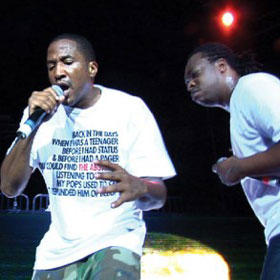Beats, Rhymes, And Life: The Travels Of A Tribe Called Quest

3.5/5
The very nature of the documentary makes it one of the most difficult genres of film to enjoy. It is meant to educate a person about a topic involving reality, rather than provide an escape for its viewers via out and out entertainment – the main purpose of going to the movies. However, Beats, Rhymes, & Life: The Travels of A Tribe Called Quest, is not your average documentary.
Michael Rapaport’s film carefully navigates us through the past and present of this seminal music act to unfold the journey of A Tribe Called Quest, in a way that appeals to a broader audience of music enthusiasts aside from Hip-Hop fans. There is not a moment of emptiness, prolonged interviewing, or lack of visual stimulation. Every second of footage in Beats, Rhymes, & Life counts towards reminding the world why, in this time of excessive and fast paced music production, A Tribe Called Quest still matters.
The film opens with footage from A Tribe Called Quest’s concert on their Rock The Bells Tour in Seattle in 2008. This concert marked their first time performing together in ten years, and in comparison to the crowds’ excitement, their energy seems strained. This footage of their incoherant stage presence of now make us wonder how a group with such an influential reputation could have gotten to this point. And just as you begin feeling sorry for these old hip-hop geniuses, Rapaport warps us back to the beginning with their biggest hit, “Can I Kick It?” to accompany the animated opening credits.
Having pumped the audience up from this throwback, their infectious and mellow rhymes and beats have you bouncing in your seat while the tribe members, affected musicians, and affiliates unravel the story of A Tribe Called Quest. The growth apart between the members of the group is blatantly conveyed through the structure of the film. Q-Tip, Phife Dawg, DJ Ali Shaheed Muhammad and Jarobi Whites each have individual interview segments, in which they discuss their personal contribution to the Tribe, but no two members speak directly to the camera together in recent interviews. This perfectly highlights their individual accomplishments without creating an uncomfortable confrontation.
The infamous conflict between Q-Tip and Phife does not even come up until much later in the film, keeping the nostalgia of their prime flowing as smoothly as their music. Q-Tip and Phife share how their relationship began in purity at church when they were about two, while Ali and Jarobi came into the picture much later on in high school. Their creativity was boundless. Their original rhymes, questionable attire, and flawless mixing and matching of their favorite musical influences pointed the trajectory to their success. De La Soul, The Jungle Brothers, the Beastie Boys, Pharell Williams and other artists accredit the magic of the Tribe for their own aspirations.
Unfortunately, the joy of watching the Tribe’s rise to fame is soon halted by Phife’s diagnosis with Type I diabetes. Though you are still tapping your foot to the background music, Phife’s denial about his health undoubtedly brings a dark cloud over the film as tension surrounds this life or death situation for the group. It is heartbreaking to watch the “yin and yang” dynamic between Phife and Q-Tip go sour, but both members are at fault. There is also a correlation between Phife’s illness and his jealousy towards Q-Tip being the forefront of the Tribe as they became more successful. But Q-Tip’s headstrong personality and meticulousness about his music are equally a struggle to deal with.
Their break-up, instigated by Q-Tip was tragic for fans and friends of the group, but it was both inevitable and necessary. The film continues to follow each member of the Tribe as they embark on a solo career and keeps a special focus on Phife’s fight against diabetes. As Phife becomes increasingly ill, Q-Tip becomes increasingly arrogant and the person you end up sympathizing with the most is Ali, who is caught between the two. As the conflicts of the group are analyzed, clips from the Rock The Bells tour become increasingly difficult to watch.
The anti-harmony within the Tribe is heartbreaking and suddenly you add this to the list of reasons you wish it were still 1990. After an hour and thirty-eight minutes of a trip down memory lane, Beats, Rhymes, & Life ends on a civil note for A Tribe Called Quest. In the words of Q-Tip, “I think the reason A Tribe Called Quest is still relevant, is because it’s truth.” Michael Rapaport artfully pays tribute to how A Tribe Called Quest hid nothing in their music and the beauty of their honesty is truly tear invoking.
RELATED ARTICLES
Get the most-revealing celebrity conversations with the uInterview podcast!





Leave a comment